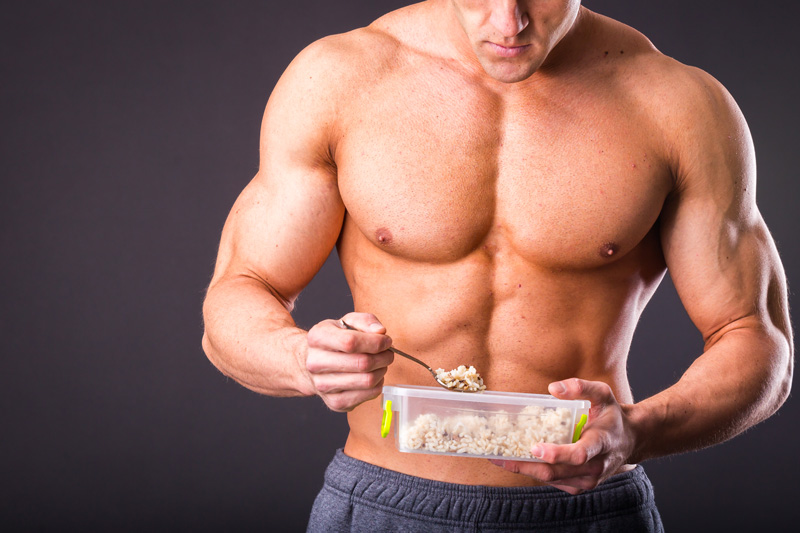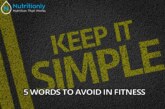Story Highlights
- Protein
- Fats
- Carbohydrates
 When it comes to building muscle, the proper nutrition is a must. Notice, that I said gaining muscle, not weight. There’s a big difference there.
When it comes to building muscle, the proper nutrition is a must. Notice, that I said gaining muscle, not weight. There’s a big difference there.
Gaining weight is easy. Gaining muscle is a bit more difficult but a lot more rewarding, no doubt. Don’t let that scare you off. The most difficult thing is eating enough but we’ll address that in a future article. For now, we’ll focus on the what.
Protein Priority
In order to build lean muscle tissue, adequate protein intake is a must!
Muscle is made up of individual amino acids (i.e. protein). When you break your muscles down in the gym, you are creating a demand for the body to rebuild and repair. This process requires many nutrients and protein is a big player.
A couple of critical aspects of protein that you should be aware of are:
1. Stick to complete sources of protein. Complete sources contain all the essential amino acid (EAAs). These are essential because you must get them from your diet. Complete protein sources include:
- Beef
- Chicken
- Eggs
- Fish
- Protein Powders (i.e. whey, egg, goat whey, etc)
2. The amount of protein one is to consume is a highly debated topic. There are many theories; but what I have found is that it’s quite difficult to overdo protein.
I choose to error on the side of too much versus too little. Protein is a very satiety nutrient so it would be difficult to over do it to the point of it being unhealthy. Having said that, I don’t believe anybody should ever eat more than 300g/day. The specific amounts vary based upon specific needs.
A good rule of thumb would be to consume 1g of protein per 1lbs of body weight (BW) per day. So if you were 185 lbs, you would consume 185g of protein per day.
This is a safe ratio to start out with. You may find that it’s difficult to consume that amount of protein initially, especially women. You will get use to it with time, and taking protein shakes will help. Gradually increasing intake over time will help you get there.
Fats
Fats are essential in building lean muscle mass as well. They play a huge role in regulating/producing hormones. Without the anabolic (tissue building) hormones such as Testosterone, Insulin-Like Growth Factor (IGF-1), and DHEA there will be little to none muscle gain.
It’s crucial to keep these hormones in optimal levels as well as keep the catabolic (tissue breakdown) hormones, such as Cortisol, at bay.
Fats are also a great energy source. They provide twice the energy per gram compared to carbohydrates. Like protein, there are essential fatty acids (EFAs) you must consume in the diet. The best source of these EFAs is fish and seafood.
- Salmon (Wild-Caught)
- Sardines
- Fish Oil Supplement
When it comes to fats, the source is critical. We want to limit trans fats as much as possible. These offer very little benefit to the body. Quality fats that come from animal sources should be grass-fed, wild caught, or eat a diet that’s as close to their natural diet as possible.
The old saying, “you are what you eat” is not entirely true. Rather, it should be more like, “you are what you eat, eats.”
For those without a big appetite, you can get your protein and fats in with several of the same sources. Fattier cuts of beef, eggs, and fish all contain the essential proteins and fats you need. When deciding on how much fat to consume, I would suggest 0.4 – 0.6g per pound of body weight. If you’re 185 lbs, you would consume 74-111g.
Carbohydrates
Carbohydrate intake will be the most variable nutrient among the population. It’s very individual. Some people can handle a lot of carbs, while others blow up like a balloon. I assume that you want to put on quality, lean muscle and not a bunch of weight that would include a significant amount of fat.
If that’s the case, carbohydrates should be kept relatively moderate. Again, the quality of carbohydrates is important, although not as important as fats. You can get away with some less “healthy” options, if you choose too. I’d recommend the majority of your carbs come from the following:
- Green Leafy Vegetables (i.e. broccoli, spinach, kale, asparagus, etc)
- Rice
- Potatoes (sweet or white)
- Oatmeal
- Cereal (non-fat/low fat)
As I said previously, the range on carbohydrates will vary greatly based on the individual. 1-3g per pound of bodyweight would be pretty typical consumption of carbohydrates. Our 185 lb guy would eat 185-555g of carbs based on tolerance and needs.
Recap
Maintaining an anabolic environment in your body is crucial to adding quality muscle mass. Follow the tips above and you’ll be well on your way to catching yourself some gains.
Be sure to check back here often to get the latest information and tips to help you build muscle, lose fat, and achieve the physique you desire.





